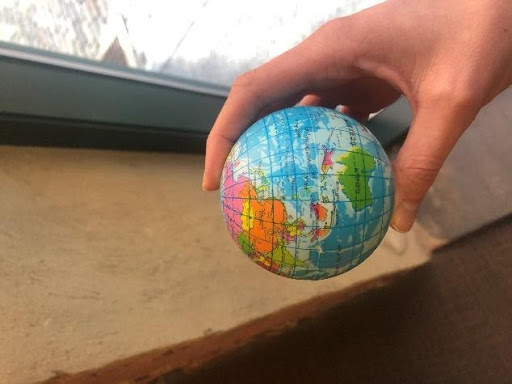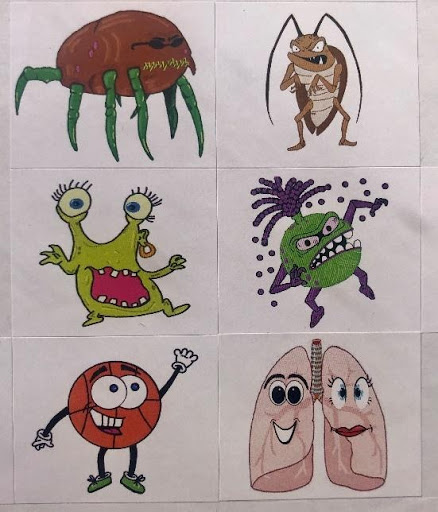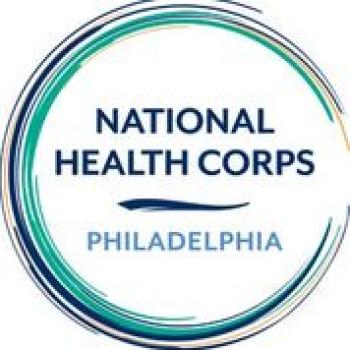K-8 Wisdom by Hannah Warshawsky
I serve as a community health worker in two different school-based health centers in North Philly. In this role, which includes many different components, I am lucky enough to do health education with children, both virtually and in-person. I focus on different material with each student, but the primary areas I cover are asthma education and healthy lifestyle education (which includes nutrition, sleep hygiene, and body positivity). My favorite part about being a community health worker has been getting to hear all the hilarious, adorable, brilliant, wise, and sometimes nonsensical things my students say to me. Here, I will share a few memories:
At the start of each asthma education lesson, I will often ask my students if they’ve had to use their rescue inhaler since the last time I saw them. Then, we will talk about exactly what they were doing and what was around them when their asthma was acting up, to get better at identifying their triggers and bodily warning signs.
Me: Have you had to use your rescue inhaler at all since the last time I saw you?
3rd grader: Yes, once. But I can’t remember when.
Me: Do you remember where you were? Were you at home or were you outside? Was it on a day when you had school or was it on the weekend?
3rd grader: Um, I think it was the weekend. I think it was October 35th.
 Sometimes I give my students small toys, like fidget spinners, to hold during our lessons, so they have something to play with and keep their hands busy. One of the toys I use is a small tennis-ball sized stress ball (the type that you can squeeze), with the globe printed onto it.
Sometimes I give my students small toys, like fidget spinners, to hold during our lessons, so they have something to play with and keep their hands busy. One of the toys I use is a small tennis-ball sized stress ball (the type that you can squeeze), with the globe printed onto it.
3rd grader: *randomly points at a country on the globe* What’s this?
Me: That’s Saudi Arabia.
*Long pause as she intently studies the tiny globe*
3rd grader: Well, where’s Philly?
Over Zoom, when I was having a good hair day:
7th grader: I see that you got your hair done.
Me: Oh, what? I didn’t actually. Does it look different?
7th grader: Yeah, well usually it’s a bit more… stiff.
At the end of a session with a student, I always ask if they have any questions or anything else they’d like to share with me. In response to that question…
5th grade: Miss Hannah, if you were in the Walking Dead, what would you do?
Me: Like in a zombie apocalypse? I would probably die.
5th grader: That’s weak. And lame.
In the first time I meet with a student for asthma education, I teach them how asthma affects their lungs. To start, I will ask the student to point to where on their body they feel their asthma. They always gesture to their chest. Then, I ask what is inside their body there (prompting them to answer “lungs”).
Me: Great, so I see you’re pointing to your chest. Do you know what’s inside your body there?
2nd grader: My stomach?
Me: No, close! Actually your stomach is lower down. Up there in your chest, are your lungs. Have you heard of “lungs” before?
2nd grader: Yes, it’s where food goes.
 At the end of each asthma education lesson, the student and I will update their progress report and add a sticker next to the lesson we’ve just completed. Usually, the stickers we use have a little character on them and younger students like to give them names. This student, in past weeks, had named his stickers things like “Bobby,” “Mr. Helper,” and “Ms. Sunshine.”
At the end of each asthma education lesson, the student and I will update their progress report and add a sticker next to the lesson we’ve just completed. Usually, the stickers we use have a little character on them and younger students like to give them names. This student, in past weeks, had named his stickers things like “Bobby,” “Mr. Helper,” and “Ms. Sunshine.”
Me: What would you like to name your sticker this week?
3rd grader: Um, how about “iPhone 11?”
One of the things I focus on with my students is how to become comfortable talking about their asthma with others and how to advocate for themselves if they need to (for making up missed classwork, explaining their asthma to a new teacher or coach, etc.). We will often run through practice scenarios to get them comfortable with the kinds of conversations they may need to have. In this situation, we were discussing the hypothetical of being in an environment where the only adult in the room doesn’t already know they have asthma (for example, a substitute teacher, or a new friend’s parent). What might they say to that adult to alert them if they are experiencing their bodily warning signs?
Me: So, you start to feel your warning signs, and the only grown-up nearby doesn’t already know you and know that you have asthma. What might you say to them so that they can help you?
1st grader: Well, I would probably say, “I’m the boss, and I got this.”
 After a child uses their inhaler, they are supposed to rinse their mouth out with water to prevent fungal infection. This is something I often go over with my students, because many of them don’t know to do this.
After a child uses their inhaler, they are supposed to rinse their mouth out with water to prevent fungal infection. This is something I often go over with my students, because many of them don’t know to do this.
Me: So, after you use your pump, you should swish some water around in your mouth and then spit it out.
4th grader: Why does it have to be water?
Me: Well, what else would you use?
4th grader: Orange juice.
